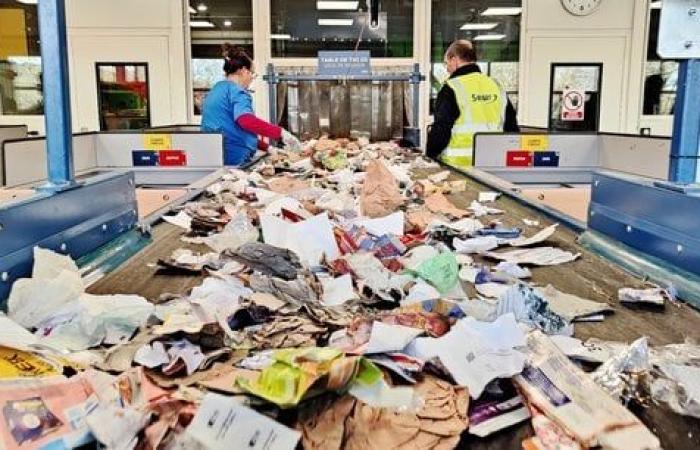
Plastics, paper, cardboard, cans… A string of packaging moves at full speed on floor-to-ceiling conveyor belts. Collected in the yellow bins of 520,000 Girondins, this waste is automatically sorted by size, shape, then material, before going through a final human verification.
This meticulous process takes place at the heart of the Saint-Denis-de-Pile sorting center, near Libourne, inaugurated on December 20, 2024. At the end of this process, the 34,000 tonnes of packaging sorted each year are compacted , then transported to recovery sites, 80% of which are in France.
A local public company in charge
Beyond its state-of-the-art technical capabilities, this industrial tool has the particularity of being jointly supported by seven waste treatment unions representing around a third of the Gironde population. An unprecedented arrangement for an investment of this magnitude which amounts to 27 million euros. The world of waste is indeed a complex universe where the acronyms of public actors are as numerous as the types of materials to be collected.
And Gironde, the largest department in France, must adapt both to the 20,000 new inhabitants who settle there each year and to the extension of sorting instructions. Enough to encourage pooling: “ This new sorting center is the culmination of a long road strewn with pitfalls that began in 2015 with the evolution of legislation then with the creation of a local public company [SPL] commune in 2019. We had to convince a lot of people to get there », Rewinds Christophe Doray, the president of this SPL called TriGironde.
A private company with 100% public ownership, it has chosen to entrust this public contract to the Ile-de-France company Sepur, in charge of designing, building and operating this brand new sorting center. And Sepur, which has a turnover of 400 million euros for 260 employees in 2024, far from the giants of the sector, promises a waste sorting cost lower than what communities paid separately until then and a valuation of 95 % of incoming volumes.
Towards a political agreement on household waste
« I hope that other cooperation of this type can be formalized on household waste. », Slips Christophe Doray in his inauguration speech. A barely veiled allusion to the political negotiations initiated since 2020 between Bordeaux Métropole and the 14 other Gironde intermunicipalities on the sensitive subject of the cost of incineration of household waste. Negotiations which resulted in a joint declaration initialed at the end of 2024 to commit to setting a single price per ton incinerated for all residents of the department. An important step which puts an end to a form of territorial inequality.
Indeed, as part of the delegation entrusted in 2020 by Bordeaux Métropole to Veolia, the price of household waste incineration is very different between Bordeaux Métropole, owner of the only two incinerators in Gironde, and the other intercommunal authorities to which it praised the use. When the first pays 45 euros per tonne, the second must pay 135 euros, or three times more expensive. A completely legal arrangement which allowed the Metropolis to balance its own accounts, as highlighted by the Court of Auditors in 2021.
Bordeaux Métropole should involve rural municipalities in waste management
A balance price around 100 euros per tonne
But faced with protests from its neighbors, the Metropolis agreed to review the equation of the future delegation planned for 2028. “ The agreement defines a balance price of around 100 euros per tonne for everyone while guaranteeing Bordeaux Métropole a right of priority and the collection of rent for the provision of the two incinerators. », Explains Jean-François Auby, the president of Semoctom which brings together eight intercommunalities in Entre-deux-Mers. “ This is a significant effort by the Metropolis and, for us, it is a victory compared to the current very penalizing situation. »
This gesture by the Bordeaux metropolitan area is part of the desire for territorial openness carried by the left-wing majority elected in 2020 to the Metropolis and now chaired by the socialist Christine Bost. It is also a decision fueled by the growing awareness of territorial interdependencies in terms of waste but also access to water or even energy and food resources.
Who is Christine Bost, new president of Bordeaux Métropole?
A complex legal arrangement
Everything must now move quickly. The 14 waste management structures will first come together in a new local public company by June 2025 to obtain a critical size. This SPL will then create with Bordeaux Métropole, by the end of the year, a public interest group to manage the two incinerators in Bègles and Cenon. It is this GIP which will launch the new public service delegation by piloting this public policy in an unprecedented way at the departmental level.
With the risk of increasing local taxes for the 750,000 inhabitants of the Metropolis in 2028. “ Probably but not necessarily », replies Jean-François Auby. “ Because the annual rent of 13.5 million euros which will be paid to the Metropolis for the use of equipment that has already been depreciated will lower the bill. » The fact remains that incineration capacities will remain below needs by 2030. Bordeaux Métropole therefore hopes to reduce the quantities of household waste by 15% in 2030 compared to 2010 to arrive at 440 kilos per year per inhabitant.
Paris wants to reduce its waste by 100,000 tonnes by 2030





